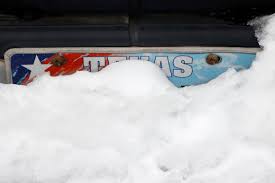 View from My Back Steps
View from My Back Steps
By
John I. Blair
March 2021
After decades of thinking we knew everything there was to know about Texas weather and all its vagaries, February 2021 taught us we were wrong Ė horribly wrong.
Starting Sunday, February 14 the strongest arctic air invasion to hit in the last century came blasting down from the north, dropping temperatures below zero Fahrenheit in little more than 24 hours. (Our normal lows here in winter are in the 20s.) Snow (a rarity here) swirled in misty tornados in the dark air, piling eventually to more than a foot on my patio, covering up flower pots, water basins, cat shelters, low shrubs. I huddled down under blankets on my bed. And then the power failed, along with my heating system. Eventually, my son managed to come to rescue me, taking me to his house where the power miraculously stayed functioning. I had left what I could in food and water for my housecats. Except for a couple of bowls of dry chow, the outdoor cats were on their own (which is where they had been much of their lives anyway). As for me, I was deeply grateful for family, hot food, and the use of a couch to sleep on. (See pic below of snow piled up behind car, license barely showing.)
Two days later I came back to a home with electricity and heat, but no water. Millions of Texans were in the same predicament, or worse Ė sometimes much worse. People died. Pets and farm animals died. Millions of small animals died. And the fallout in terms of property damage (from burst water lines), economic damage (from closed businesses and inability to go to work, auto wrecks Ė one in Fort Worth involving more than 100 cars and trucks), and political recriminations will be going on for years for why our power and water systems failed so disastrously.
Now, a week later, this being Texas, itís sunny, warm, not a trace of snow. The water supply is back (and safe to drink). The surviving birds and squirrels are continuing as if nothing happened. All of my outdoor cats appear to have survived with little or no harm. Lots of plants are wilted, but most will recover. Nature is almost infinitely resilient. Iím not so sure about us humans though. Every time the lights blink, I flinch. I intend to start keeping a stockpile of jugs of water in the garage against another water supply failure. And maybe being a bit more frugal in my use of gas, electricity, water.
All disasters, of whatever type or magnitude, are potential learning opportunities (if you survive them). I am already thinking of what I can learn from this experience beyond keeping jugs of water in the garage and perhaps buying a pair of galoshes. My lessons could also include treasuring, even more than I always have, every bit of life. Treasuring my family and friends (Iíve taking to phoning people Ė especially those who live alone Ė every few days to check on them and just to make human contact). Being even more attentive to the moment-by-moment pleasures and treasures of being alive. For example, Iíve long enjoyed gardening, but havenít the physical ability to kneel and dig any more, so I havenít actually gardened in a couple of years. But two days ago I ordered a rolling, rotating garden stool so I can sit down on my patio and scoot around from flower pot to flower pot, tending plants, sniffing flowers and herbs, touching the soil with my bare fingers. Staying, literally, in contact with life.
Iíll conclude with this old poem (which Iíve shared before).
I CLING TO LIFE
I cling to life when death
Surrounds this place
With reminders
That I canít evade.
Why should I heed?
Death will find me
When my time is done
And needs no guide.
I donít try to hide
But go on loving life,
Warming my old bones
Deep in its sweet embrace.
©2014 John I. Blair
Click on author's byline for bio and list of other works published by Pencil Stubs Online.

|